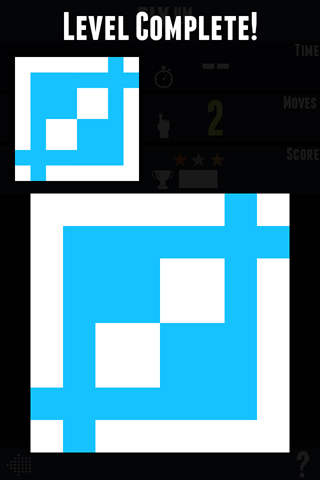Bastion
LQ: 9.15
Recommended Age: 10+
Skills Used: Planning, Working Memory, Mathematics, Reading

Fixum is a puzzle game where players have to assemble a number of gridded tiles in a way that matches the diagram. As players progress through the game, the diagrams get much harder to reproduce. At first users may only need one or two moves to reassemble puzzle pieces. In later levels the shapes are more intricate and player need a plan before they can begin mixing and matching. Pieces can only be swapped two at a time. In order to switch the location of each piece, players simply tap on the two tiles they wish to switch. A time limit as well as a move cap come into play at certain points, introducing an increased level of difficultly to levels that are already quite hard. Players have the ability to rotate tiles too. Therefore, it’s important that players have developed a strong spacial intelligence — an ability to picture the outcome of future moves. There are five sets of 50 levels in Fixum, so players will have no shortage of levels. There is no inappropriate content in Fixum and it’s recommended to players ages 6 and older.
Teachers: check out the classroom guide!
Developing a systematic approach for setting and achieving goals. Improving short-term planning.
Putting together the Fixum puzzle piece involves much more planning than whimsical assembly. Especially in the more difficult levels, players can only make a certain number of moves. That means there is little room for error. If players want to avoid continually retrying a puzzle, then they need to plan ahead. Player who picture the outcome of each move before swapping tiles on the grid are more likely to avoid making an unnecessary move. When levels afford players the opportunity to rotate tiles in addition to a simply swap, it can cause alot of frustration. Because each tile can be rotated in four ways, players can waste most of their moves by rotating incorrectly. It's important to get the correct rotation on the first try. This will keep players from having to retry the level. But it is difficult to determine what a rotated tile will look like in the mind's eye. Players have to be keen planners, exercising forethought and good spacial intelligence.
Adapting and adjusting to changing conditions and expectations.
 In Fixum, the flexibility thinking skill is just as important as the planning skill -- if not more so. While it's important to have an plan of attack when putting together a puzzle, players must be able to consider changes and alter their strategies once the gameplay is underway. This becomes increasingly important as the levels get more difficult and the patters harder to imitate. And when Fixum starts to restrict the number of moves players do not have the leeway to make mistakes. But if they realize a tile was rotated improperly, players need to make a quick adjustment. It's all about working on-the-fly, and adaption to the new conditions the game presents: whether it's a time restriction or an allowance of possible moves. Player must adapt quickly, to these conditions as well as the increasing levels if difficulty.
In Fixum, the flexibility thinking skill is just as important as the planning skill -- if not more so. While it's important to have an plan of attack when putting together a puzzle, players must be able to consider changes and alter their strategies once the gameplay is underway. This becomes increasingly important as the levels get more difficult and the patters harder to imitate. And when Fixum starts to restrict the number of moves players do not have the leeway to make mistakes. But if they realize a tile was rotated improperly, players need to make a quick adjustment. It's all about working on-the-fly, and adaption to the new conditions the game presents: whether it's a time restriction or an allowance of possible moves. Player must adapt quickly, to these conditions as well as the increasing levels if difficulty.
All membership plans come with full access to our entire suite of tools learning guides, and resources. Here are a few of the ones we think you’ll like the most: